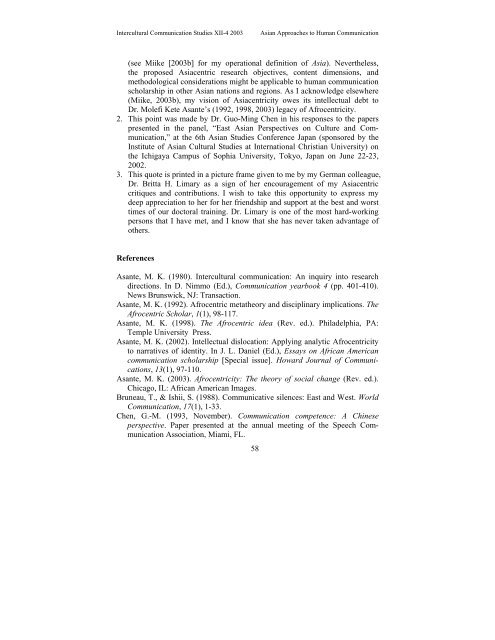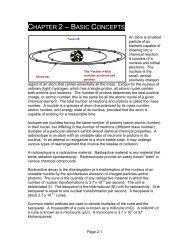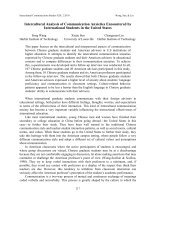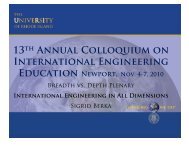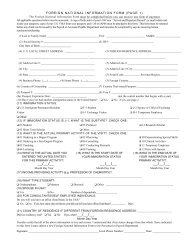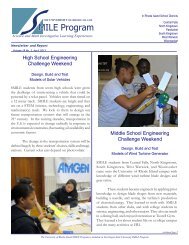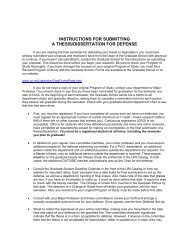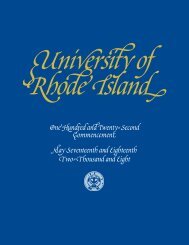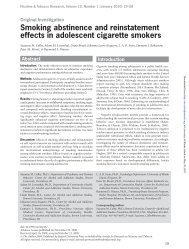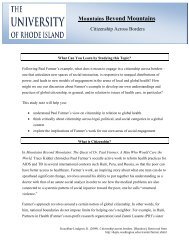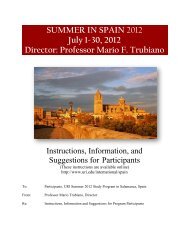asian approaches to human communication - University of Rhode ...
asian approaches to human communication - University of Rhode ...
asian approaches to human communication - University of Rhode ...
You also want an ePaper? Increase the reach of your titles
YUMPU automatically turns print PDFs into web optimized ePapers that Google loves.
Intercultural Communication Studies XII-4 2003 Asian Approaches <strong>to</strong> Human Communication<br />
(see Miike [2003b] for my operational definition <strong>of</strong> Asia). Nevertheless,<br />
the proposed Asiacentric research objectives, content dimensions, and<br />
methodological considerations might be applicable <strong>to</strong> <strong>human</strong> <strong>communication</strong><br />
scholarship in other Asian nations and regions. As I acknowledge elsewhere<br />
(Miike, 2003b), my vision <strong>of</strong> Asiacentricity owes its intellectual debt <strong>to</strong><br />
Dr. Molefi Kete Asante’s (1992, 1998, 2003) legacy <strong>of</strong> Afrocentricity.<br />
2. This point was made by Dr. Guo-Ming Chen in his responses <strong>to</strong> the papers<br />
presented in the panel, “East Asian Perspectives on Culture and Communication,”<br />
at the 6th Asian Studies Conference Japan (sponsored by the<br />
Institute <strong>of</strong> Asian Cultural Studies at International Christian <strong>University</strong>) on<br />
the Ichigaya Campus <strong>of</strong> Sophia <strong>University</strong>, Tokyo, Japan on June 22-23,<br />
2002.<br />
3. This quote is printed in a picture frame given <strong>to</strong> me by my German colleague,<br />
Dr. Britta H. Limary as a sign <strong>of</strong> her encouragement <strong>of</strong> my Asiacentric<br />
critiques and contributions. I wish <strong>to</strong> take this opportunity <strong>to</strong> express my<br />
deep appreciation <strong>to</strong> her for her friendship and support at the best and worst<br />
times <strong>of</strong> our doc<strong>to</strong>ral training. Dr. Limary is one <strong>of</strong> the most hard-working<br />
persons that I have met, and I know that she has never taken advantage <strong>of</strong><br />
others.<br />
References<br />
Asante, M. K. (1980). Intercultural <strong>communication</strong>: An inquiry in<strong>to</strong> research<br />
directions. In D. Nimmo (Ed.), Communication yearbook 4 (pp. 401-410).<br />
News Brunswick, NJ: Transaction.<br />
Asante, M. K. (1992). Afrocentric metatheory and disciplinary implications. The<br />
Afrocentric Scholar, 1(1), 98-117.<br />
Asante, M. K. (1998). The Afrocentric idea (Rev. ed.). Philadelphia, PA:<br />
Temple <strong>University</strong> Press.<br />
Asante, M. K. (2002). Intellectual dislocation: Applying analytic Afrocentricity<br />
<strong>to</strong> narratives <strong>of</strong> identity. In J. L. Daniel (Ed.), Essays on African American<br />
<strong>communication</strong> scholarship [Special issue]. Howard Journal <strong>of</strong> Communications,<br />
13(1), 97-110.<br />
Asante, M. K. (2003). Afrocentricity: The theory <strong>of</strong> social change (Rev. ed.).<br />
Chicago, IL: African American Images.<br />
Bruneau, T., & Ishii, S. (1988). Communicative silences: East and West. World<br />
Communication, 17(1), 1-33.<br />
Chen, G.-M. (1993, November). Communication competence: A Chinese<br />
perspective. Paper presented at the annual meeting <strong>of</strong> the Speech Communication<br />
Association, Miami, FL.<br />
58


